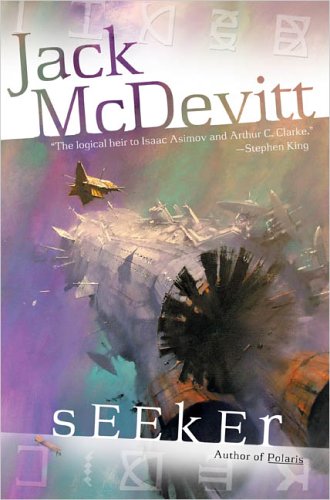Jack McDevitt, Seeker
reviewed by Danielle L. Parker

|
|
Seeker
Author: Jack McDevittPublisher: Penguin, 2005 Hardcover: $24.95 U.S. Length: 355 pages ISBN: 0-441-01329-5 |
Any of you remember Mycroft Holmes? He was the ‘smarter than his brother Sherlock’ genius who solved crimes while sitting, most of the time, on his vast-as-a-whale duff. Eventually this early avatar of the corpulent genius turned into the more famous and equally corpulent Nero Wolfe and his much-tried assistant Archie. Archie was the legman, the lesser light who gathered the necessary physical evidence and did the running-around. This allowed Wolfe to solve the crime in his usual spectacularly logical fashion from the comfort of his size XXL easy chair.
In Jack McDevitt’s new story, Seeker, we have another classic mystery. We’re looking for a long-lost treasure, and the long-suffering Chase is the legman (woman, actually). Her boss, antiquities dealer Alex Benedict, plays the role of the brain. (He’s not fat, which, if I wanted to quibble, tampers with the tradition, but I’m not stuffy.)
Yes, it’s an old formula, but it hasn’t lost its charm, not even nearly ten thousand years into the future of humanity. Chase and her boss are hot on the hunt of souvenirs they can market to the antiquities business. With a clearly tongue-in-cheek wink at the broken ears and armless torsos of Greek and Roman time that sell so well in our own day, Chase and Alec market cups, towels, old clothing, old electronic equipment, and myriad other commonplace objects that have been touched by the gold of time. Derelict ships, decrepit space stations, abandoned colonies and their contents are all fair game. The everyday flotsam of other ages finds itself on an unfamiliar pedestal. Warhol would surely have approved. His Campbell Soup Tins would have been worth a king’s ransom.
Chase and Alex are offered a seemingly unremarkable ceramic cup with a questionable provenance. But there’s an eagle on the cup, and strange lettering they translate as long-lost English. There’s reason to believe the cup came from a ship that disappeared nine thousand years ago. It’s the Seeker, an enormous ship that carried nearly a thousand passengers to a mysterious hidden colony, Margolia. Over the years, Margolia has become a mythic lost Atlantis. Its colonists fled an oppressive America to freedom (in another of McDevitt’s tongue-in-cheeks, not one I liked this time, the America of our own near future becomes a nasty totalitarian theocracy, and China the last free democracy on Earth. China? Must be a first for anything, we’ll presume. I do get a little tired of reading these not-so-subtle jabs against the Great U. S. of A., especially from fellow Americans).
Chase and Alex begin the arduous work of tracing the cup’s origin. The trail leads them through an angry ex-girlfriend and her petty thief boyfriend to a pair of long dead explorers who apparently kept their mouths shut just a little too long about the fabulous find they intended to keep for themselves. The explorers took the secret to their grave, and Chase, well named it appears, has to hunt half the known universe to follow the trail. In the meantime, competitors dog their heels, as well as unknown others with more sinister intentions than greed. And once Chase and Alex at last find the wreck of the Seeker, the mystery has only begun to unfold...
This is an engaging mystery in the form of a classic treasure (or Lost Race) hunt. If you’re looking for sociological science fiction, you won’t find it here; the humans of McDevitt’s time could be your next-door neighbors (before we all turn into those hideous American zealots McDevitt foretells, I mean). We’re not smarter; nine thousand years into the future, McDevitt’s dispersed humans are still swearing by God and getting married and divorced and picking up good-looking members of the opposite sex in bars. Crime, too, hasn’t gone away, and the penalties for the plenteous assaults and robberies committed against our duo in this story seem a little ineffective (even to the eventual personality re-programming that takes cares of those who just can’t leave crime alone, even after all the hand-slaps). In a way the very familiarity of the setting is part of the book’s charm.
Alex himself makes a fair Nero Wolfe archetype, more distinct, as is probably fitting, than his sketchier Archie-archetype, the much put-upon Chase, who narrates the story without really involving us too deeply in her emotional life. There’s some great astrophysics stuff for those who enjoy it. But the fun of this plot and clue-driven story is in the digging our pair does, even if I could see the eventual climax of this story coming a mile off. Nor was the uncovering of the villains the whammy the author may have hoped for either, at least for me. Some villains are impressive. Others are just... excuse me... windy.
But I enjoyed the story, and I’ll look for more of Alex’s adventures now. Classic follow-the-next-clue mysteries, whether they’re nine thousand years in the future or Victorian, are fine by me. Check it out!
Copyright © 2006 by Danielle L. Parker

